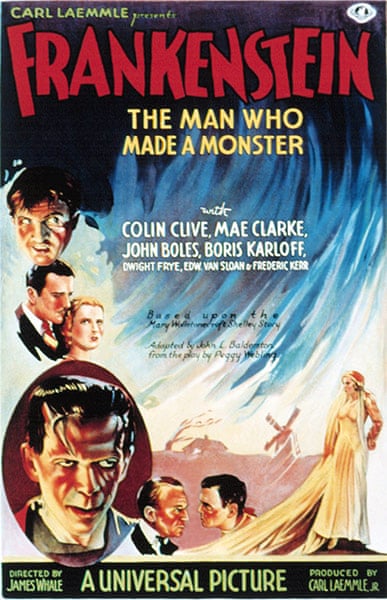This was an essay I wrote in a Monsters in Film course I took in the Fall of 2014. In the Essay I discuss how Frankenstein's Monster's monstrous actions in the classic novel Mary Shelley's Frankenstein are not his fault, but the fault of his creator, Dr. Victor Frankenstein. Also briefly discussing the Humanity of The Monster.
In popular culture the Frankenstein monster is depicted as a hulking brood with childlike intelligence. The real Frankenstein monster from Mary Shelley’s Frankenstein could not farther from this depiction. Although he does start out in a similar manner, he evolves into a being of great intelligence and contains an abundance of human characteristics. Throughout he novel he commits various atrocities by his own doing, but I believe he is not responsible for these acts. He is a victim of circumstance, beginning with his untimely and unnatural creation by Victor Frankenstein.
To make case for the Monster one needs to start at his genesis. He was given life by an ambitiously overzealous person, Frankenstein, who took it upon himself to delve into the science of re-animation. I would say it was irresponsible of him to go against the natural order of life and create life through materials gained from corpses. Frankenstein was so blinded by his scientific pursuits that he did not see the error of his ways until it was too late. Then in a most irresponsible way he abandons his creation. Instead of even attempting rectify the wrong he has committed, he retreats within himself. His abandonment of his creation is similar to that of a parent abandoning their newborn child. I believe through this event that Frankenstein became the one who was chiefly responsible for the Monster’s subsequent actions. Metaphorically, he drops the pebble in the water that creates the ripples of his own suffering.
The Monster educates himself through the observation of humans. But what struck me as quite interesting is that even before he begins his earnest observations he has a natural benevolent behavior. When he is attacked by people in a village his reaction to run instead of lash out in anger. His earliest emotional feelings towards the family is of compassion. When he sees that they need firewood he takes it upon himself to provide it to them. When he sees that one of their main causes of grief is lack of food, he feels regretful for stealing some. His consumption of fruits and vegetables instead of killing for nourishment seems to be indicative of his benevolent nature. His benevolent nature develop over the time he observes them. His vicarious bond becomes so strong with these people that he believes that his benevolent nature will be enough to overcome his physical ugliness. He wants so badly to feel such human interaction like love, friendship, and general human warmth that he is emotional devastated by the rejection of this family. This event is important because now he knows that he does not fit in the human world despite how much he tries. Even when he tries to save a woman from drowning he is looked upon as a monster.
As a result of this alienation, in desperate frustration and anger for vengeance, he murders Victor’s young brother, named William, and frames the boy’s nanny Justine. During the encounter the child reveals he is a Frankenstein, which triggers a blind anger within The Monster. I blame Dr. Frankenstein for his brother's murder mores than The Monster because it is he who has made the name a source of anger and hatred. Later, when the Monster confronts Frankenstein he does so not in a confrontational way but to strike a deal with him. He desires a female companion because he knows that he will never be able to assimilate himself into human society. If such a request is granted he will never bother another human being in his life and live peacefully in South America. He does not want to kill anyone further, he just seeks basic human needs. When Frankenstein abolishes the deal, he is now forced to carry out his revenge on Frankenstein. But, as come to find out that he regrets every negative act that he has done. He even weeps and begs forgiveness from Frankenstein’s corpse. The regret has consumed him so much that he is resolute to destroy himself so that no one will ever create such a monster again. In a cyclical motion. The Monsters negative acts upon the world were a result of his negative act in creating him.
